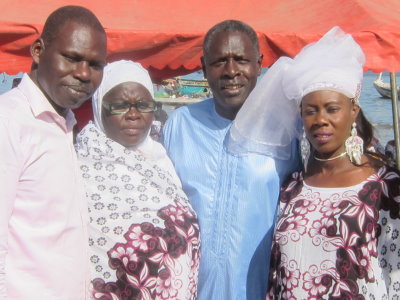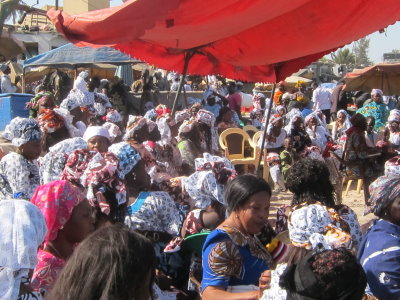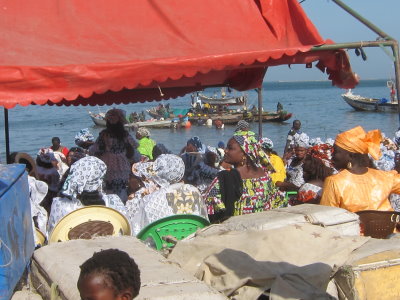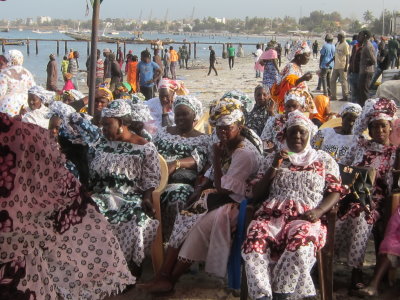 The initiative of the women of GIE PARASE in Hann pêcheurs - voice their grievances.
The initiative of the women of GIE PARASE in Hann pêcheurs - voice their grievances.
On May 1st, 2018, the women members of the PARASE Economic Interest Grouping (GIE) in Hann celebrated Labour Day on the fish landing area of Hann, where their headquarters are located. Mundus maris was invited and represented by his vice-president and coordinator of the Mundus maris Club Senegal, Mr Aliou Sall. The latter was one of the sponsors and was also asked to lead a panel discussion.
This initiative demonstrates the will of the GIE to become gradually a social movement in order to go forward including in its collaboration with Mundus maris. In the framework of your line of work about and with "Women facing new challenges, in particular that of globalisation" we thus share the impressions of this moving event.
More than 500 women followed the call, all of them members of the network. Representatives of public authorities graced the celebrations, a fact that is of interest for more than one reason:
 First of all, it is noteworthy that small-scale fisheries are still not appreciated by public authorities in line with their great socio-economic and cultural importance - without even speaking about their significant role in food security. Public politicies continue to favour industrial fisheries which are often involved in illegal, unregulated and unregistered (IUU) operations even though their negative impacts are well established.
First of all, it is noteworthy that small-scale fisheries are still not appreciated by public authorities in line with their great socio-economic and cultural importance - without even speaking about their significant role in food security. Public politicies continue to favour industrial fisheries which are often involved in illegal, unregulated and unregistered (IUU) operations even though their negative impacts are well established.
Secondly, as it is an informal sector, despite the efforts made for years by these always marginalised communities to be heard - see the case of the CNPS - trade unionism is struggling to find its true place in a sector which is seen as still being at the stage of hunters and gatherers.
Finally, and as a direct consequence, despite the tradition of trade unionism rooted in the world of Senegalese workers, until today, the major Senegalese trade union formations - workers, food workers, teachers, etc. - have not yet realised the importance of integrating issues into their agenda specific to a sector as vital as artisanal fisheries. In particular, the particular problems of these women deserve to be addressed, because without them the artisanal fisheries would not have survived against all odds. Thus, it is with these considerations in mind that the women's decision to be their own mouthpiece and that of other actors - fishermen and any other ancillary, related or even peripheral occupations - is of paramount importance. It is a first among many initiatives undertaken so far in Senegal to defend the interests of the actors who depend on it.
 As illustrated by their agenda the women have sent clear messages to the public authorities (the mayor, municipal councillors, the young MEP representing the community and the State). They focus essentially on the following:
As illustrated by their agenda the women have sent clear messages to the public authorities (the mayor, municipal councillors, the young MEP representing the community and the State). They focus essentially on the following:
First, the difficult living and working conditions of small-scale fishing stakeholders, particularly women in small-scale fisheries, many of whom are relegated more and more to secondary responsibilities, compounded by and engendering problems of safety and daily work accidents;
Secondly, we need to mention the imperative for the municipal and state authorities in charge of the artisanal fishing sector to make efforts to become better acquainted with its role. The predominant marginalisation makes many of the actors along the value chains almost invisible despite their important contribution to the sector's functioning. They are so marginalised that they still do not enjoy the visibility and the recognition they deserve from these same decision-makers. To this end, the micro-fishmongers who are the main women leaders of this GIE wanted to make known primarily the difficult conditions of the most vulnerable actors in small-scale fisheries, namely the women cleaning and scaling the landed fish. They also denounced that women retailers are experiencing difficulties in accessing working capital on a daily basis. The fish carriers, who unload the canoes, encounter the same problems.
 Finally, at the end of this day full in grievances, but also rich in colour and emotions, and following the speech of the mayor of Hann, the women sent a strong message to the municipal and state authorities so that the latter recognise the importance artisanal fisheries for socio-economic development and the legitimate interests of the sector. Consequently, the populations that depend on it economically and culturally must be taken much better into account in the public policies and the development plan of the municipality.
Finally, at the end of this day full in grievances, but also rich in colour and emotions, and following the speech of the mayor of Hann, the women sent a strong message to the municipal and state authorities so that the latter recognise the importance artisanal fisheries for socio-economic development and the legitimate interests of the sector. Consequently, the populations that depend on it economically and culturally must be taken much better into account in the public policies and the development plan of the municipality.
To mark the contribution of Mundus maris to this exceptional event, in addition to the service Mr Sall as an expert, the latter has handed over a 50 euro envelope towards helping the women cover the substantial costs. This is but a symbolic gesture made on an ad hoc basis since the bulk of our support for these women will be developed over a longer time frame, especially in the form of advice, support and creation of synergy with other actors in the region, including at international level. The aim is to help them to guarantee the institutional sustainability of their organisation, GIE PARASE, and its continued commitment to the visibility of women and the improvement of their working and living conditions.
Text and photos: Aliou SALL








